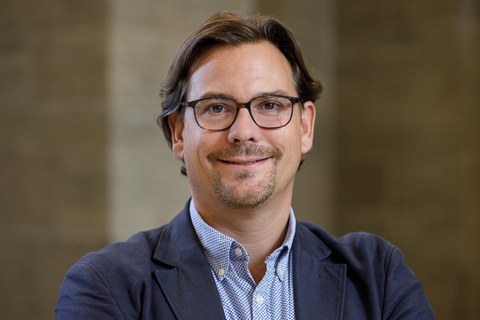Oct 29, 2024
Interview with Prof. Christian Leßmann: Volunteering as a building block of a functioning democracy
This year, TUD and Directorate University Culture in particular are taking a closer look at democracy and freedom. One of the pillars of a democratic society is volunteering, which in some areas has become indispensable.
Christian Leßmann is Chair of Economics, esp. International Economics at TUD, and is also involved in various scientific institutions. In addition to his research and teaching activities, he is also an active volunteer. Today, we from culTUre are talking to him about his work with the literacy helpers project (Leselernhelfer).
Please describe your volunteering work. What exactly do you do? Can you explain what the literacy helpers are?
The literacy helpers from the Kindervereinigung Dresden children's association offer one-to-one mentoring for children. What makes the program special is that the mentors can respond very individually to the needs of the children taking into account how the kids are doing on that particular day, as opposed to collective group activities to promote reading. Our project provides a platform for schools and potential volunteers to find a good match. The weekly reading session takes place in the schools or the after-school care centers, so that the hurdle for the children to participate is minimal. I am a co-initiator and patron of the initiative and I am actively involved in both public relations and fundraising. The actual matching and coordination work is done by the children's association.
What successes and challenges have there been in this project?
It is encouraging that the response from schools has been very positive and that there are no reservations. On the one hand, this is a success for the initiative, but it also shows how much demand there is. The biggest challenge now is to find and place a large number of dedicated reading mentors. We already have around 20 volunteers working at ten Dresden schools, even though we only started at the beginning of the current school year. But that's not nearly enough to cover all the requests from schools. So, if you or someone you know is interested in volunteering, you can simply register online as an interested party on the children's association website.
Is there a connection between your work at TUD and your work with the literacy helpers?
Not really. However, as an economist, I know that education is a key prerequisite for economic development – it forms the knowledge capital of a nation. At the macroeconomic level, it is a key prerequisite for technological progress, and at the individual level, education is, of course, an imperative prerequisite for finding a good job and participating in society. Unfortunately, educational inequality in Germany is extremely high. I would like to see the German government make significant progress in this area, but I fear that without volunteer work, we will not get as far as we have to. On the one hand, this is frustrating because I consider it a real failure of the state, but on the other hand, it is a great source of motivation.
Why is volunteering important to you? In your opinion, what significance does volunteering have in our society and democracy?
Personally, it gives me the opportunity to really give something back to society. Moreover, I rarely see any success in my job, or maybe I don't manage to perceive it that way. An example from my discipline, economics: I have just successfully published a study that me and my colleagues have been working on for about seven years. For three years, we went from top journal to top journal, and sometimes we just had bad luck, until we finally succeeded. It's a very tough business and you have to be able to handle frustration. In this voluntary project, I can do something very specific and also have a great influence on the result.
Volunteering has a high value in society. The state is not omnipotent – even if it likes to suggest to be. Without the voluntary commitment of around 29 million people in Germany, we would be much poorer in terms of security, culture and education. I think associations and volunteering are an essential social bond that creates trust between people.
How do you motivate others or your environment to volunteer?
Not at all, actually. It is a very individual decision whether to take on a voluntary position. On the other hand, I am not at all embarrassed to ask suitable people for a donation for our initiative. Anyone who would like to support our project through their own commitment or a donation can find all the information on the children's association website.
- Find out more about the “Leselernhelfer” on the homepage of the Dresden Children's Association e. V.: https://kindervereinigung-dresden.de/leselernhelfer/

